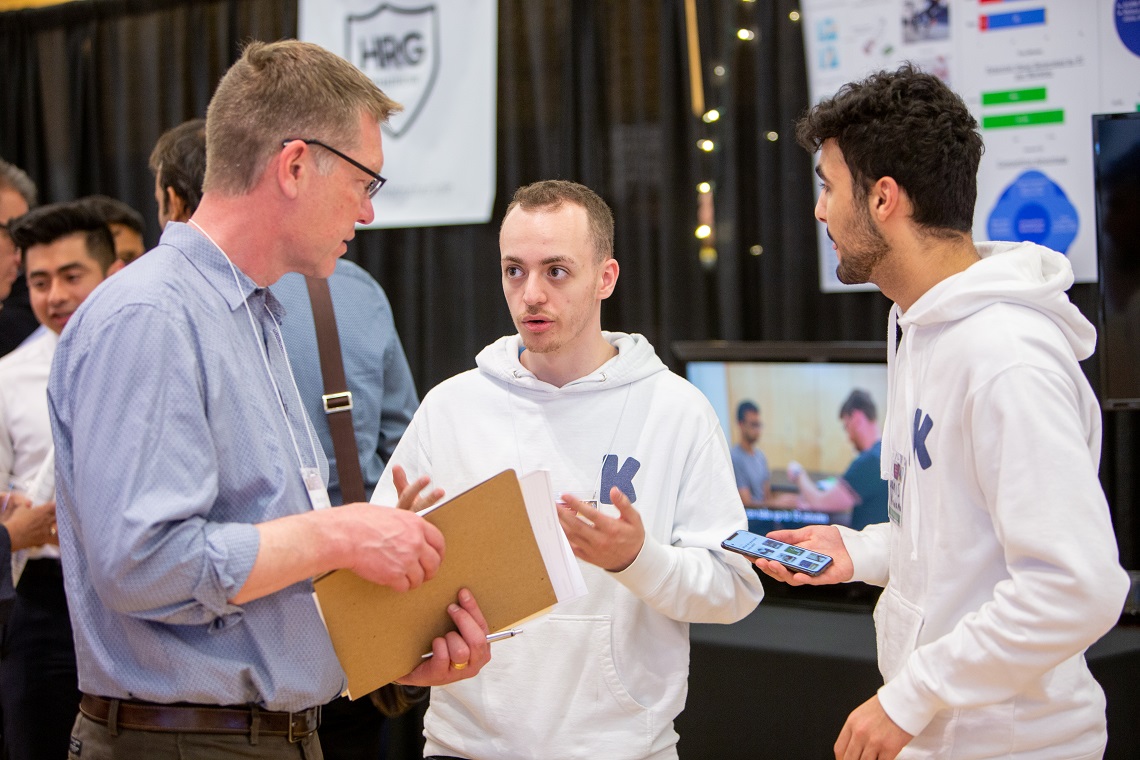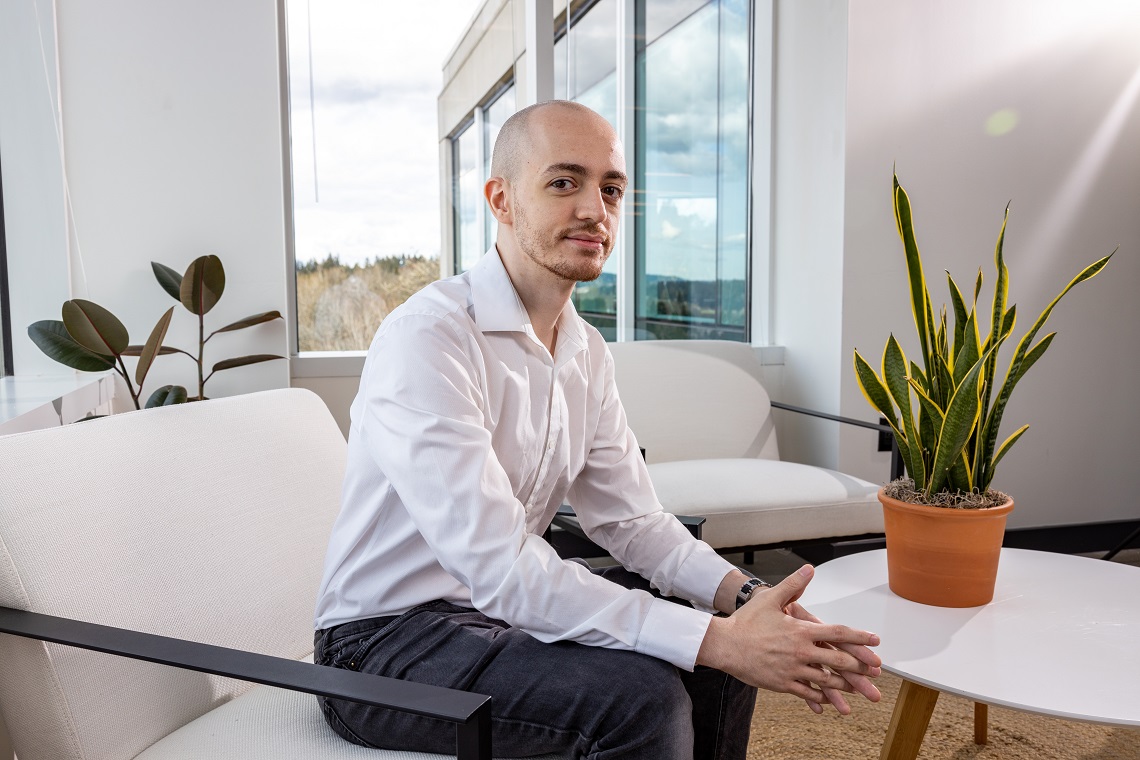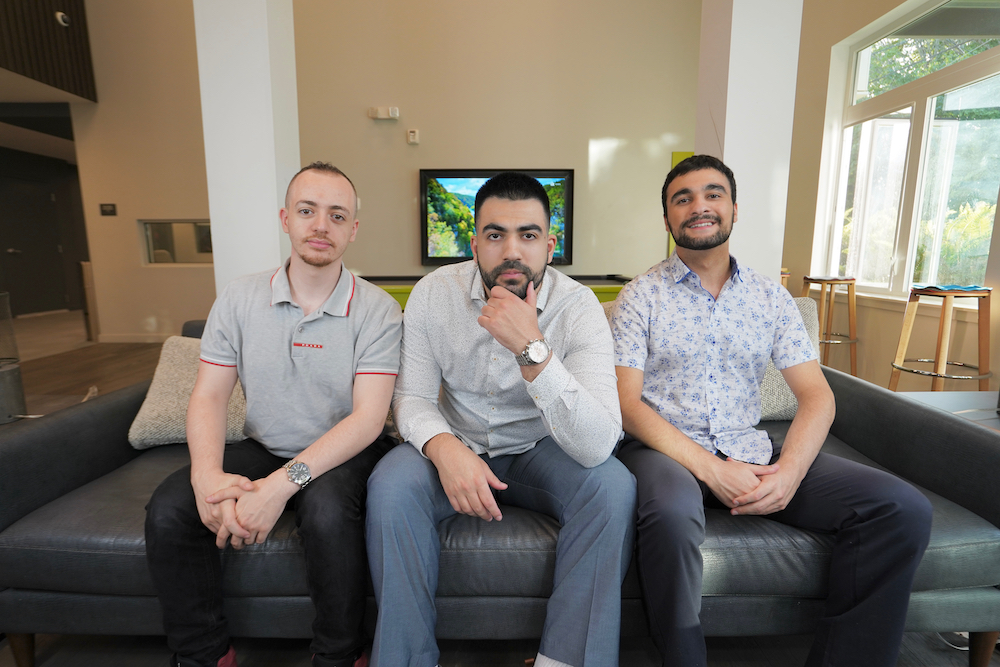Amin Shaykho and Marwan El-Rukby
Tutoring, On Demand
Through Kadama, Marwan El-Rukby and Amin Shaykho connect students with tutors for homework help and test prep—right when it’s needed
Amin Shaykho and Marwan El-Rukby
A passion for educational accessibility led Marwan El-Rukby (BA 2019) to become co-founder and chief operating officer of Kadama, the nation’s largest education social media brand. Drawing its name from the Arabic word for “service,” Kadama is a mobile application that provides on-demand help with homework, essays and exam prep. Users can select from a wide variety of subjects, set their own budget and get instant help.
The brand launched in 2019 and has reached #2 in the App Store’s education category. After a successful $1.7 million seed funding round in 2021, El-Rukby and co-founders Amin Shaykho (BS 2018) and Dani Shaykho were recognized on the Forbes “30 Under 30” education lists.
Student-led startup
Marwan El-Rukby and Amin Shaykho began working on a service-based prototype a year before El-Rukby started at the Foster School of Business and the summer before Shaykho began his computer science studies at the University of Washington. Dani Shaykho, Amin’s younger brother, joined in the journey as he made his way through high school and eventually to UW Bothell, where he’s now a senior studying computing and software systems.
El-Rukby attributes his achievements with Kadama’s business management structure to the entrepreneurial environment he experienced at Foster. “Whether it was the classes I took or the entrepreneurship programs I participated in, such as the Dempsey Startup Competition and Jones + Foster Accelerator,” he says. “It’s made a tremendous impact on me.”

The startup process can be confusing and daunting for students looking to launch a product during their college years. The Jones + Foster Accelerator program helps early-stage, student-led companies with milestone-setting, entrepreneurship workshops, mentorship from entrepreneurs and investors, and up to $25,000 in seed funding.
Kadama graduated in 2020 from the accelerator and a year later, Kadama raised a $1.7 million seed round led by Silicon Valley venture capitalist Dmitry Grishin, founder of the largest tech company in Russia. Other investors included Alliance of Angels, the largest angel investing group in the Pacific Northwest; Brett Hurt, founder of BazzarVoice; David Kamenetzky, food tech investor; and other notable angel investors.
Upon raising funds, El-Rukby resigned from his job as a financial analyst at Getty Images and Shaykho left his job as a senior software engineer at Apple.
Leveraging social media
Amin and Dani Shaykho used social media to promote and launch the Kadama brand. The pandemic was a huge accelerant. Kadama switched from in-person to virtual services once students were stuck at home and didn’t have access to traditional academic resources.
Focusing on fast-paced, exciting content to grab the attention of Gen-Z students, the Shaykho brothers leveraged TikTok and began promoting a variety of “hacks” for homework and smartphone shortcuts.
“Everybody made fun of us,” says Amin Shaykho. “There was no other education company promoting their brand on TikTok.”
But, within months, the videos went viral and the app began receiving customers. Kadama currently has 2.1 million followers on TikTok and 432,000 on Instagram.
Promoting accessible tutoring
El-Rukby had struggled in school before joining the Running Start Program at Bellevue College. Lacking the healthy habits that many students learn early in elementary school, he studied three to four times more than his classmates and would rewrite whole textbooks to retain the information.
He also experienced financial hardship in his family and dealt with a very strenuous divorce process between his parents. “I had my mother and two younger brothers that I had to take care of,” says El-Rukby. “When that separation happened, my family was in a precarious financial situation.”
But his early struggles helped shape his passion for business management and accessibility. He focused on studying business economics and learning how to financially prepare for his future to better provide for his family.

Kadama’s founders built their business proposition around the lack of affordable education support in the market. The Kadama app gives users the opportunity to set their budgets and then hire a tutor. Most hour-long tutoring sessions cost between $20-$25, which is far less expensive than the average $70-per-hour tutoring session or online tutoring packages that can run $1,000-plus.
Kadama not only provides affordable access to tutoring but also offers employment to thousands of college students. Many of the app’s tutors are students paying off their tuition, while others provide tutoring as a source of extra income for bills and medical expenses.
Adding diverse value
Kadama’s founders are proud to be the first Syrian Americans—and the youngest—to be named in a Forbes 30 under 30 list. The team hopes to unlock people’s inner potential and be an inspiration for other underrepresented entrepreneurs. Growing up, El-Rukby experienced a lack of diversity in school. He was often scared to stand out or do anything wrong that would bring any negative attention to the local Syrian refugee community. As COO of a successful startup, he’s experienced the importance of representation.
“I think when people see someone they can resonate with doing something big in an industry,” he says, “it encourages people to explore that industry and apply to those college programs.”

The Kadama team believes diversity is key in supporting a more robust workforce. “A team can achieve more with diverse viewpoints and problem-solving skills,” says Amin Shaykho.
As the creative mind behind Kadama, Shaykho used his passion for bettering humanity through technology and entrepreneurship when he conceptualized the brand. “To me, being an entrepreneur doesn’t mean you’re creating a business that focuses on revenue,” he adds. “An entrepreneur is creating something that has some sort of value to people, regardless of the end result.”
Educating the future
In a world that increasingly demands instant gratification, many students prefer Kadama’s micro-interaction approach.
 Students also favor working with peer tutors who recently studied the same course material and can understand their academic obstacles.
Students also favor working with peer tutors who recently studied the same course material and can understand their academic obstacles.
One of the brand’s success stories is Hawah Drammeh, a student who struggled with STEM (science, technology, engineering and math) as a high school senior and used the app to acquire the support she needed at the beginning of the pandemic. Drammeh is now a thriving junior studying computer science and entrepreneurship at the UW and is an incoming software engineer and machine learning intern at Microsoft.
Kadama is neither a traditional tutoring company nor a search engine that feeds you answers. Its app appeals to the next generation of students by fostering a genuine love for learning while providing them the academic help they need—right when they need it.
Additional photography by Matt Hagen.
